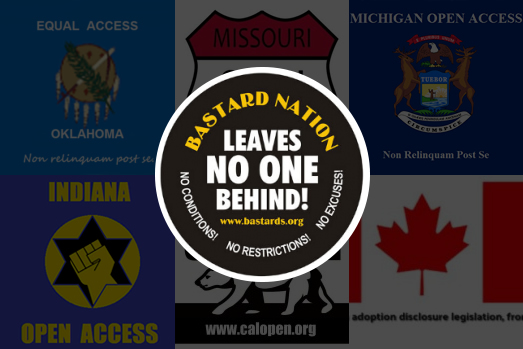MinnPost, March 14, 2013
Community Voices
Adult adoptees should have unconditional access to their original birth certificates
By James M. Hamilton | 03/14/13
Why my adopted son should be denied the right to obtain a copy of his original birth certificate from the state, while I have the absolute right to my own, is a mystery to me.
The following is adapted from testimony given today by the author before the House Health and Human Services Policy Committee at the Capitol in St. Paul.
As an adoptive father, I have spent a considerable amount of time over the past 20 years educating myself on the issues faced by adoptees and their families, biological and adoptive. It was early in that process that I first learned of the existence of sealed birth certificates. Frankly, it had never occurred to me when my son was adopted that his original records might be withheld from him by the state.
As an attorney, the idea of sealed records appalled me. What possible justification could there be for treating adult adoptees differently from the rest of society? I’ve not found any.
Today, the Minnesota Legislature has before it a bill which would correct an injustice almost 100 years in the making. House File 848 and Senate File 981, as originally proposed, would grant adult adoptees unconditional access to their original birth certificates, documents which were first sealed from public view in 1917. It’s well past time for such a bill.
Let me begin with a bit of history.
Every birth in Minnesota is memorialized by a birth certificate. A second birth certificate is issued for any minor adopted in Minnesota.
Uneven, evolving laws
Since 1917, Minnesota has sealed the original birth certificates of those born and adopted in this state. Initially, the information was locked away only from the general public. Over the years, however, the law was changed to prohibit anyone from seeing the original birth certificate, parent or offspring, adult or child. Under current law, some adult adoptees have access to their original birth certificates, some don’t. It all depends upon when they were born and whether one of their biological parents has told the state not to release that information to them.
The Legislature last considered correcting this injustice in 2008. That bill would have changed the situation slightly, allowing any adoptee at least 19 years of age to obtain an uncertified copy of his or her original certificate upon request, provided that one of the birth parents had not already vetoed the adoptee’s right to that information.
Gov. Tim Pawlenty vetoed that bill, and he was right to do so. Neither the existing law, nor the bill vetoed by Pawlenty, makes sense to this adoptive father. Why my son should be denied the right to obtain a copy of his original birth certificate from the state, while I have the absolute right to my own, is a mystery to me. Both of our births were public events, like that of virtually every other person in this state. Yet, the Legislature decided decades ago that some adults in this state should be denied access to this most fundamental personal information: who they are and where they came from.
No one should have the right to tell the state whether my son may have access to this information. Yet our current law and the failed attempt to modify it placed that right in the hands of the man and woman who conceived him. Why? Because he was adopted after being born.
Had he been placed in foster care, he would have the same rights I do. Whether he was born inside or outside of marriage, he would have the same rights I do. Whether he had been raised by one parent or two, he would have the same rights I do. But because he was adopted, the State of Minnesota has granted either of his biological parents the power to deny him the right enjoyed by every other non-adopted person in Minnesota: the right to know from whence he came.
He was right to veto, but did so for wrong reasons
Gov. Pawlenty was right to veto the 2008 bill that would have perpetuated this injustice. Sadly, he did so for all the wrong reasons. His veto was based not on the recognition of the rights of adult adoptees, but on the erroneous belief that those who relinquished children for adoption were in some way promised that the fact of the adoption would be kept forever secret by the state. He also cited a report stating that less than one-quarter of biological parents contacted by a single Minnesota adoption agency preferred not to have identifying information released by the agency.
The legal argument for opening these records is very straightforward: Every citizen should have the same right to access government held data on himself or herself. Period.
What are the legal arguments against opening these records?
Some contend that adoptees should not have unconditional access to their original birth certificates because birth parents were in some way promised that their identities would be forever secret. Yet, no Minnesota statute ever has made such a promise. The only two courts in this country ever asked to rule on that proposition have held to the contrary. See Jane Does 1 et al v. State of Oregon, Dec. 29, 1999 (rejecting claims that an Oregon open records law violated privacy and confidentiality rights guaranteed by Oregon’s Constitution and state and federal guarantees against impairment of contract) and Doe v. Sundquist, 106 F3d 702, 705 (6th Cir), cert den 522 US 810 (1997) (rejecting similar claims).
Some may contend that Minnesota law is different, because we have in the recent past permitted a birth parent to direct the state not to disclose the original birth certificate. They may even claim that permitting release of that document over their objections constitutes an invasion of their right of privacy.
A right vs. privilege
Let’s consider those arguments for just a moment. A right is universal. A privilege is permission granted to a limited class of people. What our current law has offered biological parents is a privilege. When the state grants a privilege, it may modify or revoke that privilege. We see this principle in operation in every session, as laws are enacted changing the age and conditions under which one may drive a car, buy an alcoholic beverage, qualify for various government aids, etc.
The Legislature’s initial decision to grant biological parents the privilege of barring release of their offsprings’ original birth certificates was a policy decision. So, too, is the decision to bring that privilege to an end.
You may hear claims that those who have exercised their statutory privilege have obtained a vested interest in non-disclosure and that the retroactive extinction of that privilege violates the Minnesota and United States’ Constitutions. At this point in time, that is solely a matter of opinion. No court in this country has ever addressed such a claim, much less held that the repeal of a law such as this violates any aspect of the Constitution.
Space does not permit me a detailed examination of these arguments. I will only say that the law regarding the retroactive effect of a statute is far too complex and the outcome in this case far too uncertain, for the Legislature to attempt to forecast what our courts will do. It is the Legislature’s job to establish public policy; it is the courts’ job to determine whether the Legislature’s policy decisions have infringed on any right held by any individual. Pawlenty vetoed an obscure bit of legislation on May 16, one that few Minnesotans have heard of and in which even fewer have any interest. But for tens of thousands of Minnesotans whose lives have been touched by adoption over the last 90 years, it was a significant event, one in which Pawlenty reached the right result for all the wrong reasons.
96 years of meddling is more than enough
Fortunately, my son was born in a country that does not seal original birth certificates. He already has a certified copy of his. He knows his origins. But thousands of others adopted in Minnesota since 1917 (and their descendants) will never know theirs, so long as Minnesota continues to meddle in their private lives.
Ninety-six years of such meddling is more than enough.
As an adoptive father and as an attorney, I urge the House and Senate to enact their respective bills, as introduced. Please join me in that effort.
 James M. Hamilton is an adoptive father and an attorney in private practice in St. Paul who has followed this issue in Minnesota and around the United States since 1997.
James M. Hamilton is an adoptive father and an attorney in private practice in St. Paul who has followed this issue in Minnesota and around the United States since 1997.





